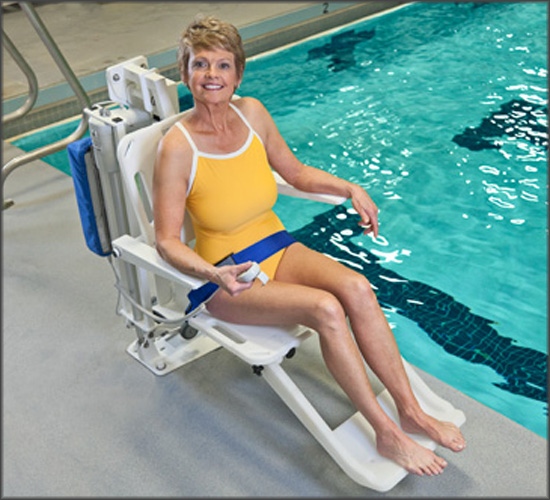A swimming pool is a treat for family and friends to spend time together relaxing, exercising and staying cool in the hot summer months. But not everyone can easily access the pool.
A multilift helps individuals who have trouble getting in and out of a pool. Just as a multilift can help a disabled individual get in and out of a vehicle, a multilift for swimming pools can also help get someone in and out of the pool. A multilift for your swimming pool is good for all ages, those who rely on wheelchairs or walkers, and even people who have weak legs and are not steady on their feet.
The multilift for swimming pools comes in different types with different features that are compliant with the federal Americans with Disabilities Act. Here are some options to consider for using a pool multi lift at your home.
Different categories of pool lifts
The three categories of multilift for pools are electronic/battery powered lifts, manual powered lifts, and water powered lifts.
Electronic-powered pool lifts use an electronic actuator that drives the lifting operation system. It produces a lot of lifting capacity, reliability, and flexibility that makes it easy to use with just about any type of pool. This lift typically operates with a simple control.
Water-powered lifts use hydraulics from water filling a sealed cylinder. This generates pressure, which causes the lift to rise. The lift lowers when the cylinder is emptied of water, which releases the pressure. These lifts are connected to a water supply, such as through a hose. Water-powered lifts are typically permanently installed because the cylinder must be against the pool wall.
Manual pool lifts operate with a hand crank or hydraulic cylinder that engages a turning gear. Using a pool multi lift that is manual is best when a sling is required to transfer someone. These lifts are also typically mounted to the pool deck as a permanent installation.
Permanent or Portable Pool Lift
Depending on how you are using a pool multi lift, it may be permanent or portable. A permanent pool lift is installed permanently to the deck or concrete pad that surrounds the pool. Permanent lifts typically are able to lift more weight than a portable pool lift. They also generally take up less storage space than a portable lift does. However, these lifts often can be misused for play by those who do not need help getting in and out of a pool. This can result in damage to the lift or reduced operating life.
Portable pool lifts do not require any anchoring or physical installation to the pool deck or the surrounding cement. Stability of the system is created through a counterweight. The lifts can be placed at any point around a pool for easiest and best use. They also can be stored away in a safe place when they are not being used, helping to preserve their longevity. However, portable pool lifts require more storage space than permanent lifts, and the counterweight system used to stabilize them can weigh as much as 1,000 pounds. It can be difficult to move around the pool, depending on who is using it and who is helping. The portable lift can also become unstable if the maximum weight allowed is exceeded.
The multilift is the most versatile pool lift, with the option to install it as a fixed or removable lift. The Wheel-A-Way™ option provides flexibility to remove the lift for poolside events or seasonal storage. Right or left side mounting means less to consider when selecting a pool lift location on the deck. The multilift is also the first pool lift to come standard with the new LiftOperator™ Intelligent Control System. The multilift is ADA-compliant and has a 350 pound lifting capacity.
Learn more about ADA Pool Lift Accessibility Guidelines
In 2010, the U.S. Department of Justice published additional regulations and clarifications that spelled out specifics for public recreational facilities. Those included public pools that must follow the regulations to remain in compliance with the Americans with Disabilities Act. Specific ADA regulatory information regarding accessibility requirements for existing swimming pools located at hotels, recreational facilities, public country clubs, health clubs and spas can be found at the ADA.gov website. So before you decide any an particular set up, be sure to check out the regulations for your situation.


